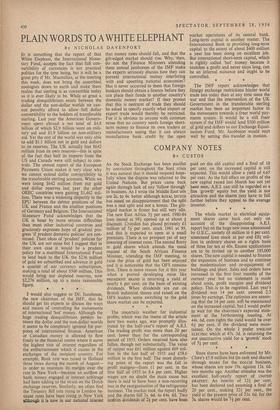PLAIN WORDS TO A WHITE ELEPHANT
BY NICHOLAS
DAVENPORT
IT is something that the report of that White Elephant, the International Mone- tary Fund, accepts the fact that full con- vertibility of currencies is not practical politics for the time being, but it will be a great pity if Mr. Macmillan, at the meeting this week, does not bring the assembled zoologists down to earth and make them realise that sterling is as convertible today as it is ever likely to be. While so great a trading disequilibrium exists between the dollar and the non-dollar worlds we can- not possibly afford to allow full dollar convertibility to the holders of transferable sterling. Last year the American Govern- ment spent abroad a net total of $4.8 billion of which $2.9 billion went on mili- tary aid and $1.9 billion on non-military aid. Yet the rest of the world was only able to add $1.1 billion net in gold and dollars to its reserves. The UK actually lost $642 million from its own reserves—this in spite of the fact that half its imports from the US and Canada were still subject to con- trols. The annual report of the European Payments Union makes it very clear why we cannot extend dollar convertibility to the transferable sterling accounts. While we were losing $642 million from our gold and dollar reserves last year the other OEEC countries were gaining $1,462 mil- lion. There was a widening disparity in the EPU between the debtor positions of the UK and France and the creditor positions of Germany and Belgium. The International Monetary Fund acknowledges that the UK is beset by more serious difficulties than most other industrial countries and graciously expresses hope of gradual pro- gress 'if prudent domestic policies' are con- tinued. Their ideas of 'prudent' policies for the UK are not mine but I suggest that in their own case it would be a prudent policy for a moribund International Fund to lend back to the UK the $236 million of gold we subscribed and advance in gold a quarter of our currency subscription, making a total of about $500 million. This would bring our depleted reserves, now $2,276 million, up to a more reasonable figure.
* * *
I would also suggest to Dr. Jacobsson, the new chairman of the IMF, that he should get his experts to discuss the ways and means of controlling the movements of international 'hot' money. Although the huge trading disequilibrium persists be- tween the dollar and the non-dollar worlds it seems to be completely ignored for pur- poses of international finance. American or Canadian money is allowed to flow freely to the financial centre where it earns the highest rate of interest regardless of the embarrassment which it causes in the exchanges of the recipient country. For example, Bank rate was raised in Holland three times during the month of August- in order to maintain its margin over the rate in New York—because an outflow of bank money engaged in interest arbitrage had been adding to the strain on the Dutch exchange reserves. Similarly, we often find the Treasury Bill rate rising in London be- cause rates have been rising in New York although it is now in our national interest
that money rates should fall, and that the gilt-edged market should rise. Why, then, do not the Finance Ministers attending these annual jamborees of the IMF make the experts seriously discuss how they can prevent international money interfering with and upsetting national economies? Has it never occurred to them that foreign bankers should obtain a licence before they can place their funds in another country's domestic money market? If they protest that this is restraint of trade they should be asked to specify exactly what import or export trade would thereby be restricted. For it is obvious to anyone with common sense that no country needs foreign short- term money to finance its own traders or manufacturers seeing that it can always manufacture bank credit by the open market operations of its central bank. Long-term capital is another matter. The International Bank in providing long-term capital to the extent of about $400 million a year has been doing an excellent job. But international short-term capital, which is rightly called 'hot' money because it snatches a profit and never stays long, can be an infernal nuisance and ought to be controlled.
The IMF report acknowledges that foreign exchange restrictions hinder world trade less today than at any time since the war and that the intervention of the UK Government in the transferable sterling market has been an important factor in the movements towards a freer world pay- ments system. It would be a still freer system if the IMF would lend $500 million of gold and dollars to our Exchange Equal- isation Fund. Mr. Jacobsson would start well by setting this transfer in motion.


































 Previous page
Previous page